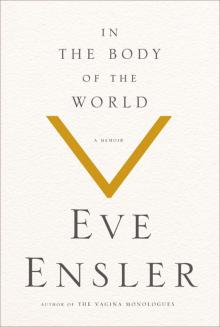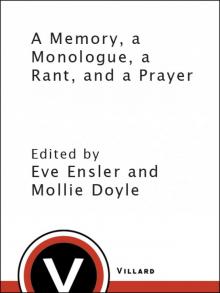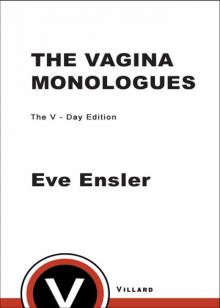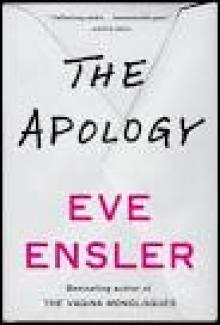- Home
- Eve Ensler
The Apology
The Apology Read online
FOR EVERY WOMAN STILL WAITING FOR AN APOLOGY
BY THE SAME AUTHOR
The Vagina Monologues
In The Body of the World: A Memoir of Cancer and Connection
I Am an Emotional Creature: The Secret Life of Girls around the World
Insecure at Last: Losing It in Our Security-Obsessed World
The Good Body
Necessary Targets: A Story of Women and War
Vagina Warriors
CONTENTS
Begin Reading
Acknowledgments
A Note on the Author
I am done waiting. My father is long dead. He will never say the words to me. He will not make the apology. So it must be imagined. For it is in our imagination that we can dream across boundaries, deepen the narrative, and design alternative outcomes.
This letter is an invocation, a calling up. I have tried to allow my father to speak to me as he would speak. Although I have written the words I needed my father to say to me, I had to make space for him to come through me.
There is so much about him, his history, that he never shared with me, so I have had to conjure much of that as well.
This letter is my attempt to endow my father with the will and the words to cross the border, and speak the language, of apology so that I can finally be free.
Dear Evie,
How very strange to be writing you. Am I writing to you from the grave or the past or the future? Am I writing as you or as you would like me to be or as I really am beneath my own limited understanding? And does it matter? Am I writing in a language I never spoke or understood which you have created inside both of our minds to bridge the gaps, the failures to connect? Maybe I am writing as I truly am, as you have freed me by your witness. Or I’m not writing this at all but simply being used as a vehicle to fulfill your own needs and version of things.
I don’t remember ever writing you a letter. I rarely wrote letters. For me to write a letter, to reach out to others, would have been a sign of weakness. People wrote letters to me. I would never let anyone know they were significant enough to me to write a letter to them. That would make me less, put me at a disadvantage. Even saying this to you feels odd. This is not something I would normally know or say unless you had entered my mind. But I would not argue with it. It feels true.
You always wrote me letters. I found that peculiar and strangely moving. We lived in the same house but you were writing to me, your little-girl handwriting attempting straight lines but wandering all over the page. It was as if you were trying to make contact with some aspect of me, a part you could not find in the heated moments of our conflict, as if you were trying through poetry to appeal to a secret self that I had once made available to you. Usually you wrote apology letters. So fitting that you would now want an apology letter from me. You were always apologizing, begging for forgiveness. I had reduced you to a daily degrading mantra of “I’m sorry.”
Once I sent you to your room without dinner and made you stay there as long as it took for you to understand and admit to your bad behavior. You were initially stubborn, quiet for twenty-four hours. Your mother was worried. But then you must have gotten hungry or bored. You wrote me a letter on a piece of cardboard that came from the dry cleaner with my shirts. You slipped it under my bedroom door. It was a dramatic plea. It was a list. You were always big on lists. I see now you needed to catalog things, make sense in a kind of literary arithmetic.
It was a list of what you had learned and what you would never do again. I remember that lying was number one. You would never lie again. And I knew even as I hounded you daily and made you believe you were a despicable liar that you were the most honest little girl I ever knew, although I did not know many little girls. I despised children. They were loud and messy and misbehaved. I was way too old to have children and I only had them to carry on my legacy. But I digress. That cardboard letter with your urgent writing in purple Magic Marker and the lopsided flowers you drew on the edges got you out of the room, and I wonder now if that is why you continued to write, as a kind of passport to freedom.
Since I left the world of the living I have been stuck in a most debilitating zone. It is very much what people describe when they talk about limbo: a void, oblivion. Limbo, not an external place exactly. To the contrary, I have been essentially nowhere. Floating, unmoored, spinning. There is nothing here, nothing to see, no trees, no ocean, no sounds or smells, no light. There is no place as you know place, no rooting, nothing to hold on to. No, nothing but the reflection of what lives inside me.
“What is hell? Hell is oneself.”
That is Eliot. You may not know that he was my favorite poet. His words come to me often in this limbo. I have been spiraling here for almost thirty-one years in your time, but it is odd as there is no time where I am. There is just an agonizing emptiness, endless swallowing space that is at once terrifyingly vast and utterly claustrophobic.
I left the world of the living with so many resentments and grudges. Even on my deathbed, the virulence of my wrath was more powerful than the cancer that consumed my body. My rage was so pernicious it was able to fight through the morphine and the delirium and fuel me to design and enact my final punishments. And your poor mother. What was she to do? I had terrorized her for so many years, battering her with my loudness, condescension, and threats that she was by then a cowed and devoted accomplice. She tried to humor me. She told me this might not be the moment to make such extreme decisions. She did everything but tell me I had lost my mind.
My very last thoughts and breaths were suffused with a desire to hurt, a desire to create long-lasting suffering. Perhaps you do not know this, but at that final moment, I insisted she strike you from my will. You would inherit nothing. “Nothing!” I said it with great force. Even in my very weakened state this vengeance gave me life. It was my last chance at abolishing you, eradicating you, punishing you.
And when your mother asked me to reconsider, I insisted that you had brought this on yourself. Why would I leave anything to a child who had been so obstinate and disloyal? Your mother’s challenging me enraged me further and I became more vindictive, attempting to erase even your character. I forced her to promise me that no matter what you told her after I was gone, she would never believe you, as it was well established many years earlier that you were a bald-faced liar. Liar. I forced your mother to commit to essentially distrusting and doubting you forever. In that sense I forced her to kill you off as I had killed you off. I forced her to choose her husband over her daughter. But this was not new. She was well practiced in that sacrifice. I had demanded this of her for most of your life. And I knew, I truly knew how much she despised herself for agreeing. I saw the way I had, over the years, eroded her self-respect as a mother, erased her confidence and voice, made her feel weak until she was no longer likable or remotely recognizable to herself, and yet I had still insisted.
I spent the first of what felt like years in this death realm in an endless loop of all the betrayals and disappointments, all the ways colleagues and children and so-called friends had enacted their stupidity or weakness, replaying each justifiable antipathy and exacting imagined revenge. Of course, you were high on the list.
I left the world so furious with you that I punished you by refusing even to let you know I was dying. I would not call to say goodbye. I wanted you to be cut and bleeding with the shards of my rage, so you would be forced to carry me around, hemorrhaging with guilt and despair, questioning for the rest of your life why you never measured up, never became the daughter I expected you to be.
Intent on leaving you without closure or finality, I didn’t even plan or allow for a memorial or a funeral. I found them to be pedestrian and pathetic displays of nonsense and useless emotion. And furthermore,
if you mourned me, there was the very likely possibility that you would release me. Withholding was the only power I had at that point, the only way to seize your being, the only way to get your attention and keep your attention.
A few days after I died, before I entered this realm, I spied you sitting on the floor of my closet in Florida, my old yellow cashmere sweater pressed against your face. At first I did not understand what you were doing, but then as I studied you, I realized you were smelling me, the residue of me, inhaling my cologne and essence, trying to find a place to harbor your grief. And despite myself, this touched me. It brought me back to a time that was soft between us, a time sheltered by an almost unbearable affection. You, on the floor of my closet, trying to find me, to find that tenderness, sparked in me a wave of sorrow and loss—and then I was gone. Gone from your world, gone from beauty, gone from the possibility of salvation. Thrown into the rampant rehashing of offenses and grievances.
They say as you live you shall die. And it’s true that over time my fury became lethal. “Anger is a poison you mix for your friend but drink yourself,” my mother would warn me, as I was always inexplicably angry. And then my rage turned, my whole system rotten and suffusing odious dread. It was as if the wrath had turned in on itself, devouring and suffocating my anguished psyche in an alley of regrets, excruciating anxiety, piercing doubts, torturous self-recrimination. There was no forward motion. There was no back. There was no way out. I had neither the language nor will nor understanding to get free, paralyzed in this zone of limbo.
I know I was a cynic who pooh-poohed the hogwash of an afterlife. But what did I really know about anything? And I wouldn’t even call this an afterlife. It’s not after anything but a continuation of. In that sense, death is agonizing and endless. Or perhaps this death, which has been specific to me. I imagine others are winged by their good purpose to more radiant zones.
If I have learned anything here, and it has been hard to learn much as my brain is addled with angst, what I have discovered is that it is critical to resolve conflicts while you are alive, as all unfinished business follows you into the next realm and determines your state of being. Each wrong you’ve caused in your life, each harm you have not taken responsibility for, becomes a kind of spiritual goo, a viscous substance that constructs your confinement. It’s a cage, but it’s inside you, and that is even more impossible and distressing. You are stuck into yourself, sucked down in the muck of eternal self-obsession. You would be screaming but the sludge is too thick to allow a voice. There is no respite.
So, thank you, Eve, for summoning me, giving me this opportunity to reckon with my horrific acts. I understand there are no guarantees that I will be released from this agonizing limbo, but your offer to receive this apology has already shifted this desperate landscape.
I realize you are clear in your purpose. The depth and sincerity and need of your mission are evident and powerful. I understand you are asking me to make an apology. I must say this is foreign and unnatural terrain for me. I don’t remember ever apologizing for anything. In fact, it was drilled into me that to apologize was to expose weakness, to lay yourself vulnerable.
I imagine my vulnerability is in fact exactly what you need from me. Perhaps it was always what you needed. I will do my best to neither justify nor rationalize my actions. I will instead attempt to make an accounting of my actions and my intentions. The telling is not meant to elicit understanding or forgiveness. It is a confession in the deepest sense. It is unquestionably something I would prefer remain hidden from you, from God, from myself. But this is the moment when I give myself without reservation, without justification, to this reckoning.
I have asked myself, What is an apology? It is a humbling. It is an admission of wrongdoings and a surrender. It is an act of intimacy and connection which requires great self-knowledge and insight. I will most certainly come up short.
This apology required time. It could not be rushed. Fortunately I have had practice here endlessly reliving and rehashing my crimes, mentally reenacting the details. I know you have said that an apology must be thorough and can only be trusted in its veracity and dedication to details. I have done my best. I have followed your very strict guidelines: Recognize what I have done as a crime. Face how deeply my actions and violations have impacted and devastated you. See you as a human being. Attempt to experience or feel what it felt like inside you. Feel profound remorse and regret over my actions. And finally, take responsibility for my actions by doing extensive work to understand what made me do what I did.
I will need to go back in this letter to locate the roots of my behavior. I will be as honest as a formerly disingenuous person can be. I will attempt to proceed with neither defensiveness nor self-pity, as I understand neither will further clarify nor resolve.
Many of the living do not believe they are in relationship with the dead. I was one of them, hiding in the delusion, or perhaps the hope, that what is gone is gone. That we pass through as flesh-and-blood creatures and die and rot or are burned into ether.
The dead are yearning for the living. It is only through the living, through their deepest imaginings and empathy, that the dead can be known to themselves and can be freed. And if the living are able and willing to access their love of the dead, able to access their anger at the dead, essentially to be in relationship and true dialogue with the dead, the dead will rise and speak. We remain lodged and hidden inside our families and loved ones, those we have harmed and those we have fostered. We are there inside the walls of the old houses and the silence of the evening, inside the celebratory moments, the rites and rituals of births and weddings and funerals and any place where the living long for the witness and approbation of the dead. We are there like a dormant cell in the bloodstream, waiting to be catalyzed by the devotion of the living, by the need of the living to understand and have resolution. There, ignited by the generosity of the living to remember and cherish and argue and wrestle and restore.
It does not surprise me that it is you, Evie, who summoned me back. You, who were willing and able to hold my sorrow and grief when I could not venture near it, to weep my tears when I was dry, to claim and hold and attempt to know the essence of a soul I had betrayed.
I am sure it must surprise you to see that I can write, and even more to discover how I write, the language I speak. Frankly, it has surprised me. I imagine it is more formal and emotional than you would have predicted. But what you don’t know (or perhaps deep inside you do), is that I dreamed of being a writer. A writer or a rabbi. I dreamed of a solitary life of meditation and study and reflection, a life of philosophy and grasping at the huge questions of meaning and matter.
I dreamed in many ways of the life you have lived. And if I take any solace in contemplating the consequences of my deplorable deeds, I sometimes imagine that perhaps it was my unfulfilled dreams that entered you and inspired your destiny. This is not an attempt to take credit for who you are or what you’ve become. You’ve made your life, every hard inch of it. And I know that so much of who you are was not so much about constructing but reconstructing, piecing back the fragments of self that I forcibly and strategically (whether consciously or not) splintered and disassembled. I am all too tragically aware of who you would have been—confident, secure in your memory and intelligence, happy, living inside your body. I saw who you were before I worked my destruction.
And perhaps that is why I had to hurt you so badly, hobble you at the knees from the beginning. There was no way I was going to let you go beyond me, show me up as the fraud or failure I was. But perhaps, just maybe, a piece of my true yearning was passed on to you. Did you know I dreamed of studying the Torah? It was my greatest ambition to give my whole self to that text, to sacrifice to it even my life.
I had no longing for children or a wife, which is why I did not marry until I was fifty. I held out as long as I could in hopes that some miraculous intervention would shift my path, grant me the dream of a life that lay buried beneath this one. I h
ad very little interest in people. They annoyed me and disappointed me, whereas books and ideas were food and inspiration. I was at heart a recluse and a seeker forced into a 1950s household with a Midwestern wife, three children, an olive-green Cadillac, and a Popsicle company to run. How absurd!
So, thank you. Your call and your presence have interrupted the spinning, and for the first time in thirty-one years, the pain and the torture have paused. For that, even if it is only momentary, I am profoundly grateful. How odd. I was never grateful. I don’t remember ever saying that word. Why would I be grateful when all the world was rightfully endowed to me? On the contrary, the world needed to be grateful for my existence.
My entitlement, the divine right of kings, was endowed by my mother, who by all accounts was an equally present, formidable, and reliable authority as God. She was very beautiful and very strict.
I was the youngest child, born much later than the others, clearly not planned but determinedly special. I was the accident that became the miracle. The golden child. The chosen one. The boy who would fulfill the promise of my mother’s highest aspirations and relieve my father of his chronic depression and disappointment. From the time I was conscious, I was made to believe I was better, smarter, more precious, more deserving than anyone around me. What I didn’t know was why. I still don’t.
What I knew instinctively is that my mother’s overwhelming need for this to be true had as much to do with her as it did with me. To deny it or contradict it would have called her fragilely assembled being into question and thrown my mother into despair.
I was her salvation. My arrival heralded the time of rising fortune. My mere existence would somehow resurrect her miserable marriage and redeem her suffering. I was light. I was darling. I was savior son. There is a kind of implicit hierarchy in adoration. The idolized one is above you, beyond you. And so I was lonely. Excruciatingly lonely. The loneliness of the adored.

 In the Body of the World
In the Body of the World A Memory, a Monologue, a Rant, and a Prayer
A Memory, a Monologue, a Rant, and a Prayer The Vagina Monologues
The Vagina Monologues The Apology
The Apology